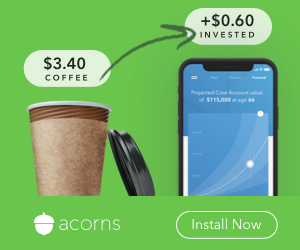“I can’t separate how my investing instincts were affected by knowing a lot more about resource limitations and the effects of climate change. It was part of the background music, like everything else I know.”
When I first started this blog, I really wanted to include aspects of money and personal finance because I felt it was important for me to pass on what I've learned about money over the past few years. While money and personal finance may not come off as related to minimalism or eco-friendly living, there is actually a big relationship between money, conscious consumption and personal security. Regardless of your financial situation, living a minimalist and eco-friendly life asks that you spend your money and time a bit differently than the norm. A minimalist and eco-friendly life is about finding and supporting things that you value and with that figuring out how to live a life that is aligned with your beliefs.
FULL DISCLOSURE: I'm not a certified financial planner/advisor nor a certified financial analyst nor an economist nor a CPA nor an accountant nor a lawyer. I'm not a finance professional through formal education. I'm a woman who believes in self-education and in sharing that knowledge with others. Take to heart that the advice written here is purely for informational purposes and should not be construed as financial advice.
SECOND DISCLOSURE: This post does contain affiliate links. See Disclosures for details.
Why Invest
I absolutely believe in the power of investing. Whether you are just out of college or already have a family, your future financial security is important and investing is a great way to not only save money, but it also provide security for your family. The piece of mind that you will have knowing that a few of your dollars are being saved up instead of being spent on objects that eventually will become obsolete or will end up in a landfill should be a priority. People sometimes automatically assume that if we care about money, we can't care about the environment or something silly like that. We all need money to survive and we all need money to lead lives. The amount is determined by you.
We all need to start thinking of money in terms of freedom. Today, most of us exchange our time for money. Yes, the money eventually pays for housing, for food, for clothing, for vacations etc., but at the heart of it, we are exchanging our time to buy other things. It would be very idealistic of us to state that money is not important. We don't live in a world where money is not necessary, but we can figure out a way to use it for good.
Why Invest Sustainably
As I've been diving deeper into the world of eco-friendly and zero waste living, I couldn't help this nagging feeling in the back of my mind about also investing with my values. Whereas before, I consumed haphazardly, not really thinking about where things came from, who made them, or why the price is so low. Now I've learned to consume better. I no longer readily shell out my hard earned money on inexpensive, low quality items and opt instead to choose quality over quantity or get items secondhand. So now that I am consuming a bit more consciously and with an eye towards sustainability, I also wanted to align my investing with my new and continuously growing values. With that I've started to do some research and invest in companies and funds that are doing more good for people and the environment. Full disclosure that I have not fully transitioned my portfolio to fully sustainable investments, but I'm learning more and taking the time to analyze and make those changes.
Each time we buy something, we offer our vote for the kind of world we want to live in, for the kind of products we want to use, and for the way we want others to be treated. In the same vain, the companies we invest in is a also a vote for the kind of things that get produced, for the way workers are treated and for the way the environment and its resources are used.
How to Invest Sustainably
As with anything, we have to do a quick audit and start small. As a first step, we need to look at our portfolios. What are we investing in? Do we know the types of companies we have money in? Are these the kinds of companies we want to support? Now, nothing is going to be perfect. Just as there is no one perfect person following a minimalist and eco-friendly lifestyle, there is no perfect company that is doing everything right. The best thing to do is to research the companies you are already investing in. Do they care about what you care about? There's a whole range of social and environmental issues that companies that take on. See if your investments align with these. If they don't fully, but you believe in parts of the company, being an investor can be a great step to helping the company push towards more transparent and sustainable business models. This is known as investor activitism. As a shareholder, you have rights and the power to exercise them if you wish a company to do more.
The changes in your portfolio doesn't have to happen overnight and I would not recommend dumping all of your portfolios at once, but after doing YOUR research, speaking with YOUR financial advisor and speaking with YOUR partner, start investing in companies and funds that align with your values. Did you know there are funds out there that promote Zero Waste and only invest in companies where Zero Waste is a goal, that promote Diversity and only invest in companies where there's at least 3 women board members, or that promote Women's Equality and only invest in companies that score high on equal pay or that promote Clean Water. I'll have a list of funds and companies at the end of this post for you to review and research. It won't be all inclusive so if there's any that I miss, let me know.
Along with everything else, nothing is perfect so make sure you analyze and research your current investments and future investments. Some funds will be invested in great companies, but may also have not so great companies at a very low percentage, you'll have to decide what is important to you. Some companies may also not divulge information properly about their practices so that's something we all have to watch out for. Regardless if where you are in sustainable investing, understand that there are always options and more information to be gathered on. With sustainable investing, we want to "Go Green and Live Rich."
So to recap:
Review your current porfolio
Research, analyze, speak with your financial advisor about moving towards more sustainable investments
Divest companies that do not fit your values
Re-invest in companies that fit your values
Re-allocate, review and monitor your portfolio
My Personal Action Items
“The idea of making as much money as you can, any way you want it, then giving it to charity of your choice. It’s like earning money on tobacco stocks all day, then giving to the American Cancer Society at night.”
So, personally for me, I use a tool called Personal Capital to look at my investments across multiple accounts. It's a free tool, but just keep in mind that they do offer fiduciary services which you are not required to take but they will try to sell you on it. I also use tools like fossilfreefunds.org to see which of my investments have a high percentage of fossil fuel investments. I also invest in companies that I now buy from and support.
Sometimes, you may not have a lot of choice in the types of funds you can invest in especially if it's a company sponsored plan, but you do have a voice. Let your company know that you are concerned with some of the investment options. If you work for a company that places sustainability as an important factor, company investments should also lean towards more sustainable practices. Again, nothing is perfect and I am not a financial advisor, but take this as a starting point for aligning your investments with your minimalist and zero waste values.
Update August 2018: I'm testing out Swell Investing and doing more research on this. Please let me know if there's anything specific you want to know more about with regards to sustainable investing.
Update Oct 2018: Final review of Swell Investing.
Update Dec 2019: Swell Investing unfortunately shut down so I’m now on the hunt for other alternatives.
Keywords and Acronyms to Know
UN Sustainable Development Goals - Guiding principles achieving sustainable development for all. Read more here.
SRI Investing - Sustainable, responsible and impact investing. It is an investment discipline that considers environmental, social and corporate governance (ESG) criteria to generate long-term competitive financial returns and positive societal impact.
ESG Criteria - Examples of ESG Criteria include climate change, carbon footprint, worker diversity, worksplace safety, board diversity, worker's compensation, water conservation and so much more.
Investment Options to Check Out
SHE - SPDR SSGA Gender Diversity Index ETF. Seeks to provide exposure to US companies that demonstrate greater gender diversity within senior leadership than other firms in their sector
No Glass Ceilings - Motif Theme that invests in top companies run by women.
PXWEX - Pax Ellevate Global Women's Index Fund invests in companies rate high for advancing women's leadership.
U.S. Trust's Women & Girls Equality Strategy - Invests in companies that score high on equal pay, promotion of women, family leave benefits, positive portrayal of women in the media, adherence to international labor laws.
GCCHX GMO Climate Change Fund - Invests in companies focused on clean energy and storage and various other companies
Swell Portfolios - Curated combinations of publicly traded companies that are taking a stand on important social and environmental trends. Use this referral link to get $50 when you sign up and make your first investment.
Green Tech
Clean Water
Zero Waste
Renewable Energy
Disease Eradication
Healthy Living
BIAWX Brown Advisory Sustainable Growth Fund - Investing approach focuses on finding companies whose environmental strategies are generating tangible business results.
Resources & References
Fossil Free Funds - Tool to help you see if your fund is invested in fossil fuel
Go Fossil Free - How to divesting fossil fuel investments
Playing the Woman Card: 5 Ways to Invest in Female-Led Companies (Forbes)
Do Good Investors: Watch Out For What These Funds Hold (Forbes)
This Save-The-Planet Mutual Fund is Beating the Market and It's Got Funk (Forbes)
Motif Investing - Investing in thematic trends














